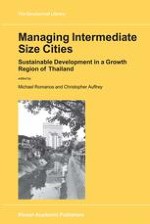2002 | OriginalPaper | Buchkapitel
Sustainable Development and Sustainable Employment in the Manufacturing Sector of Chiang Mai
An Analysis of the Thai Educational System and the Workforce Supply for the Manufacturing Sector of Northern Thailand
verfasst von : Roger J. Barry
Erschienen in: Managing Intermediate Size Cities
Verlag: Springer Netherlands
Enthalten in: Professional Book Archive
Aktivieren Sie unsere intelligente Suche, um passende Fachinhalte oder Patente zu finden.
Wählen Sie Textabschnitte aus um mit Künstlicher Intelligenz passenden Patente zu finden. powered by
Markieren Sie Textabschnitte, um KI-gestützt weitere passende Inhalte zu finden. powered by
Chiang Mai and Chiang Mai Province in Northern Thailand have experienced rapid growth, development, and subsequent urbanization, in part as a result of the growth of the manufacturing sector of the local economy. The expansion of the manufacturing sector has been fueled by technological change in agriculture, the rapid expansion of basic literacy, and a national economic policy focused on economic development. Thailand’s educational structures have been slow to respond to this change in work-force education needs. Its focus has been on providing “basic education” to make Thailand a literate nation, and a secondary focus has been to strengthen its colleges and universities to supply an educated elite. The concept that educational institutions need to develop the capacity to supply people with marketable work force skills has been slow to develop. Thailand lags behind Malaysia and Singapore in International Standards of Operation (ISO of its local industries. There is a serious shortage of workers with the technical skills necessary to meet the demands of the manufacturing sector. Thailand needs to change its educational policies to support the development of a workforce with the skills needed for an industrializing society that hopes to remains competitive in a world economy.
